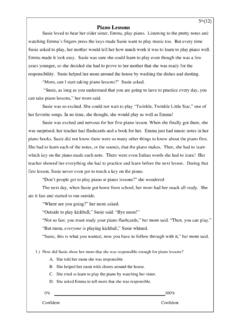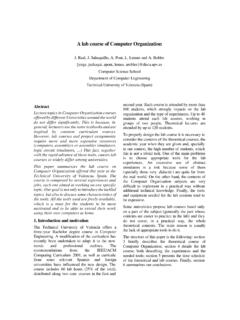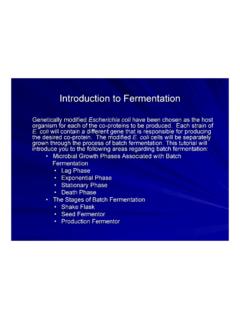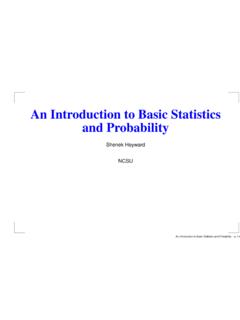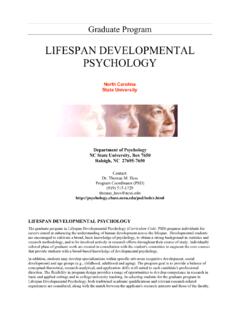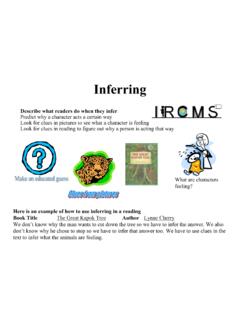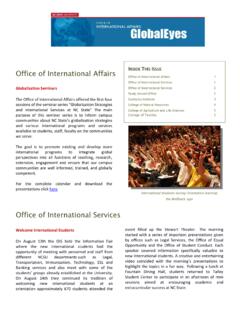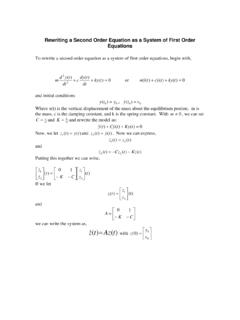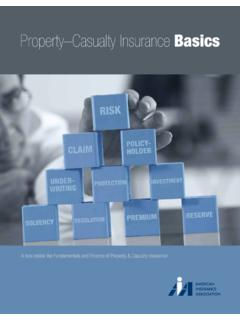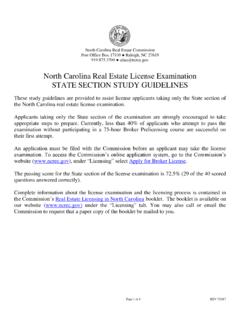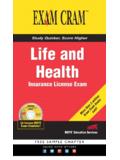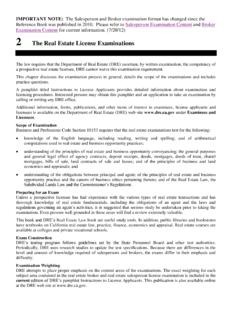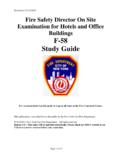Transcription of Unit 10 – The Nature of Real Property - NC State University
1 1 Unit 10 The Nature of real Property I. Distinguished From Personal Property real Property and personal Property are distinguished from one another because different rules may apply to each, such as laws of inheritance, tax laws and contract laws. real Property is immoveable Property , such as land, buildings attached to land, and other things incidental to land. Personal Property is generally moveable and is every kind of Property that is not real Property . Personal Property is classified as tangible, such as furniture, livestock, or tractors, and intangible, such as stocks, bonds, notes payable, patents, copyrights, and court judgments (which are representations of Property ). A fixture is something that was once personal Property and has become attached to real Property in such a way as to lose its status as personal Property and be considered part of the real Property .
2 The intent of the owner at the time of fixation is the primary consideration in determining whether something is permanently attached to real Property . The intent of the owner is, however, determined objectively by the actions that the owner took. One of the important consequences of this classification is that it determines what will be part of the sale or lease of real Property . Some items are easy to classify as fixtures, such as permanent buildings or fences, but others may be harder to classify, such as grain bins, shop equipment or corral headgates, and, therefore, should be specified in the sales contract or lease agreement. Some other consequences of this classification are that Property taxes may be levied on real Property but not on personal Property or that a will may specify real Property to one heir and personal Property to another.
3 The Uniform commercial Code (UCC) deals with the law of sales and commercial transactions involving personal Property , and Article 2 of the UCC deals specifically with the sale of goods, that are tangible and moveable. It may apply to goods associated with real Property . For example, if a structure or mineral is to be severed by the seller, it is covered by Article 2, but if it is to be severed by the buyer, its sale is considered part of the real Property and not governed by Article 2. A fixture filing under 2A-309 ensures that the security interest of a lender in personal Property that is to become attached to the land will have priority over the security interest attached to the real Property . For example, ABC Co. sells an air conditioning unit to B who plans to bolt it to his building. ABC finances the purchase of the unit and requires B to execute a financing statement.
4 Bank holds a security interest (deed of trust) in B's real Property including the building. Once the unit is attached to the building it becomes a fixture, a part of the real Property , subject to Bank's security interest. If ABC does nothing else, its security interest in the air conditioning unit comes after Bank's. ABC cannot even repossess it without permission from Bank. A fixture filing made with the office of the register of deeds solves this problem. Another area where confusion may arise as to whether Property is affixed to the land is growing crops. The rule is that crops which grow spontaneously on the land, such as trees, bushes, or grass, are called fructus naturales and are part of the land until severed. On the other hand, crops which result from annual planting and cultivation, 2such as cotton, tobacco, or soybeans, are called fructus industriales and are considered to be personal Property .
5 The classification of crops can determine their ownership. The doctrine of emblements denotes the right of a tenant to remove annual crops at the termination of a tenancy. North Carolina law allows the tenant to hold out for a year in lieu of emblements so long as the tenant continues to pay rent. The statute is written in mandatory terms such that it appears to replace the doctrine of emblements; however, there are no cases on point that resolve that issue. Crops that are not annual such as perennial forages, tree crops and Christmas trees are generally to be treated as part of the real estate, absent an agreement to the contrary (although there are no cases on point). II. Elements of Ownership Ownership of Property can be viewed as a bundle of sticks. The rights of the owner depend on whether he has all of the sticks in the bundle or only part of them, such as a lease or a life estate.
6 Ownership rights include the right of disposition. Property , or an interest in Property , can be sold, given away (during lifetime or at death), passed to a joint owner who has a right of survivorship, or leased to another. A Property owner also has the right of exclusion, protected by the right to bring an action for the tort of trespass (possession), and the right of enjoyment, protected by the right to bring an action for nuisance (enjoyment includes use, including destruction). There may be regulatory limits on the right to destroy one's own Property . III. Freehold Estates Estates are interests in land that are now possessory or will become possessory at some future time. This is a way of expressing ownership rights measured in terms of duration. A freehold estate has a potentially infinite duration or an unpredictable length (as compared to a leasehold estate where the lessee has the possessory right and use of the Property for a limited time only).
7 Freehold estates can be divided into fee estates and life estates. A life estate is a freehold estate whose duration is measured by the life of another. The measuring life may either be that of the holder of the life estate or a third person. They are usually created either by deed or by will. The life tenant has possessory right and use of the Property but he does not have legal title. That is vested in the reversioner or the remainderman. At the death of the measuring life, the Property belongs to a reversioner if no disposition of the fee (the title) was made at the time the life estate was created. A reversioner would be the grantor or his heirs, who have held the fee during the life estate. Alternatively, at the death of the measuring life, the Property belongs to a remainderman if the person who created the life estate designated who would take possession at the end of the life estate.
8 A life tenant (one who holds the life estate interest) has a duty to protect and preserve the Property (called the duty to avoid waste), to make and pay for repairs necessary for reasonable maintenance of the structure, to pay interest on mortgages, to pay all ordinary taxes, and to insure his interest in the Property . The expenditures are generally limited to the amount of income generated by the Property or the fair rental value of the Property . A life tenant has a right to estovers which means 3that he may cut timber for personal use as fuel, for fencing the Property , and to make repairs to structures on the Property . In general commercial timber operations are not permitted unless the Property was used for commercial timber operations prior to the creation of the life estate. The most common fee estate is the fee simple, which encompasses all of the ownership rights.
9 It can be transferred by sale, gift or inheritance to any person without any restrictions. A fee simple determinable is a fee simple estate that continues until automatically terminated by the occurrence of some specified event, after which the land reverts to the grantor or his heirs. The interest retained by the grantor in this type of ownership is called the possibility of reverter. A similar estate is called a fee simple subject to a condition subsequent. Here the fee simple estate may be terminated (but not automatically) by the grantor or his heirs upon the happening of a named event. This future interest of the grantor is called a right of entry for condition broken or a power of termination. IV. Future Interests A future interest is an estate in land that is presently owned but will not become possessory until sometime in the future.
10 The future interest may be sold, gifted, or transferred by inheritance. Examples of future interests that may be held by the grantor are: (1) reversion (the estate that remains with the grantor who transfers an estate of less duration than he owns); (2) possibility of reverter (the interest retained by the grantor of a fee simple determinable); or (3) right of entry (the interest held by the grantor who conveys a fee simple subject to a condition subsequent and expressly retains a right of entry in himself). Examples of future interests that may be held by the grantee are: (1) remainder (the interest conveyed to a third party that can be presently possessed by that party only upon the natural termination of the prior possessory interest) or (2) executory (the interest held by the grantee that does not have the characteristics of a remainder interest).
